Clean Arctic Alliance Hails IMO Move to Ban Heavy Fuel Oil From Arctic Shipping
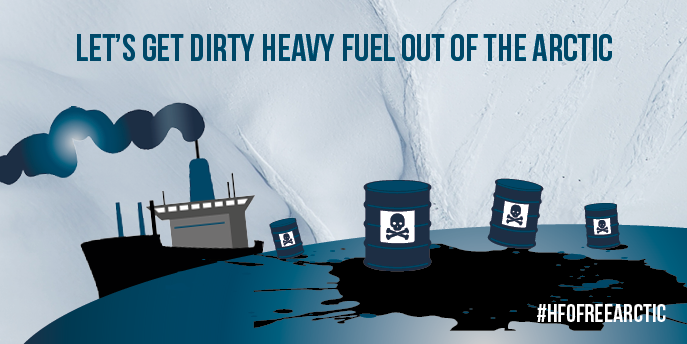
The Clean Arctic Alliance applauded progress by International Maritime Organization member states today towards banning use of the world’s dirtiest fuel – heavy fuel oil – from Arctic shipping, and called for Member States to make every effort to adopt and rapidly implement a ban by 2021, as proposed by eight IMO Member States and supported by other countries during the meeting.
IMO Member States Must Back Ban on Heavy Fuel Oil from Arctic Shipping
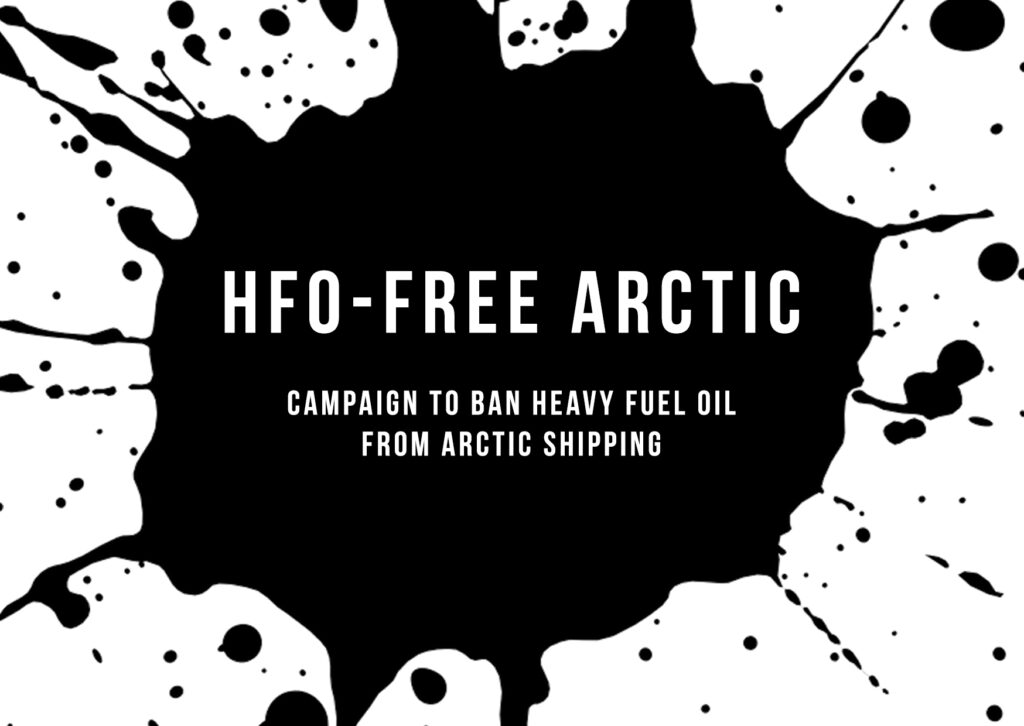
As a meeting of the International Maritime Organization’s Marine Environment Protection Committee opens today in London (MEPC72), the Clean Arctic Alliance called on IMO member states to support a proposal to ban heavy fuel oil (HFO) from Arctic shipping.
The proposal, co-sponsored by Finland, Germany, Iceland, Netherlands, New Zealand, Norway, Sweden and the US, calls for a ban on HFO, and is one of several papers on HFO use in the Arctic to be discussed at MEPC as it considers “development of measures to reduce risks of use and carriage of heavy fuel oil as fuel by ships in Arctic waters”.
Cleaner Shipping – Focus on air pollution, technical solutions and regulation
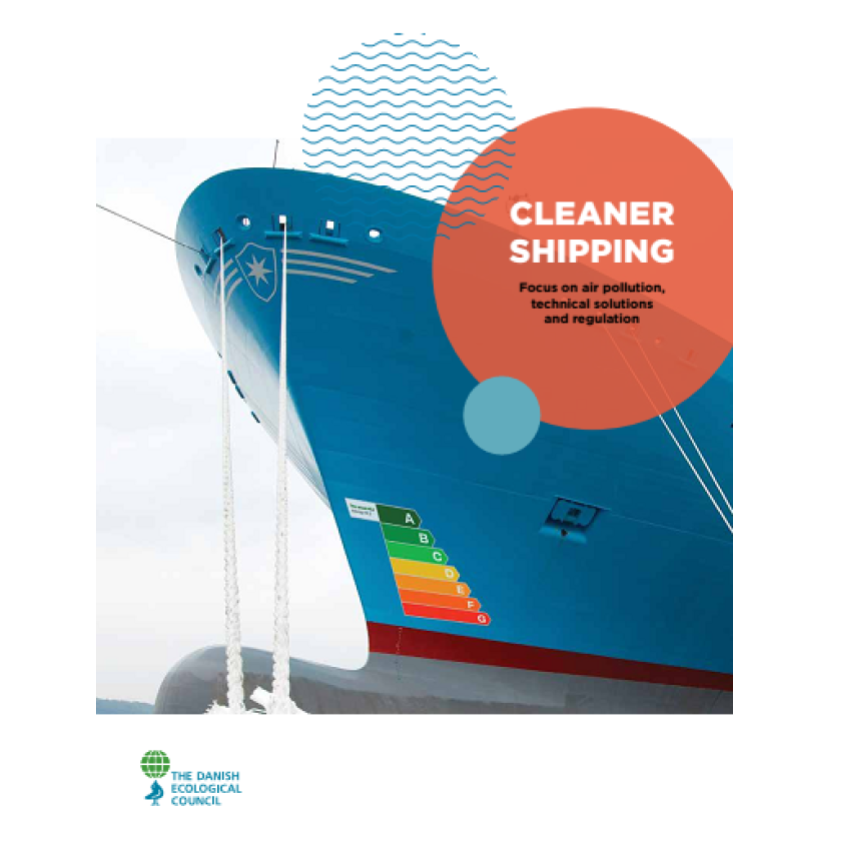
A Report by the Danish Ecological Council
This publication focuses on air pollution with CO₂, SO₂, NOx and fine/ultrafine particles from shipping, technical solutions, existing regulation, the need for further regulation and enforcement. The purpose is to inspire decision-makers and other key stakeholders to implement more ambitious regulation as well as enforcement to reduce air pollution from shipping to the benefit of shipping as a business, the climate, public health and nature.
Cleaner Shipping – Focus on air pollution, technical solutions and regulation

A Report by the Danish Ecological Council
This publication focuses on air pollution with CO₂, SO₂, NOx and fine/ultrafine particles from shipping, technical solutions, existing regulation, the need for further regulation and enforcement. The purpose is to inspire decision-makers and other key stakeholders to implement more ambitious regulation as well as enforcement to reduce air pollution from shipping to the benefit of shipping as a business, the climate, public health and nature.
The Climate Crisis: A Message from the Arctic
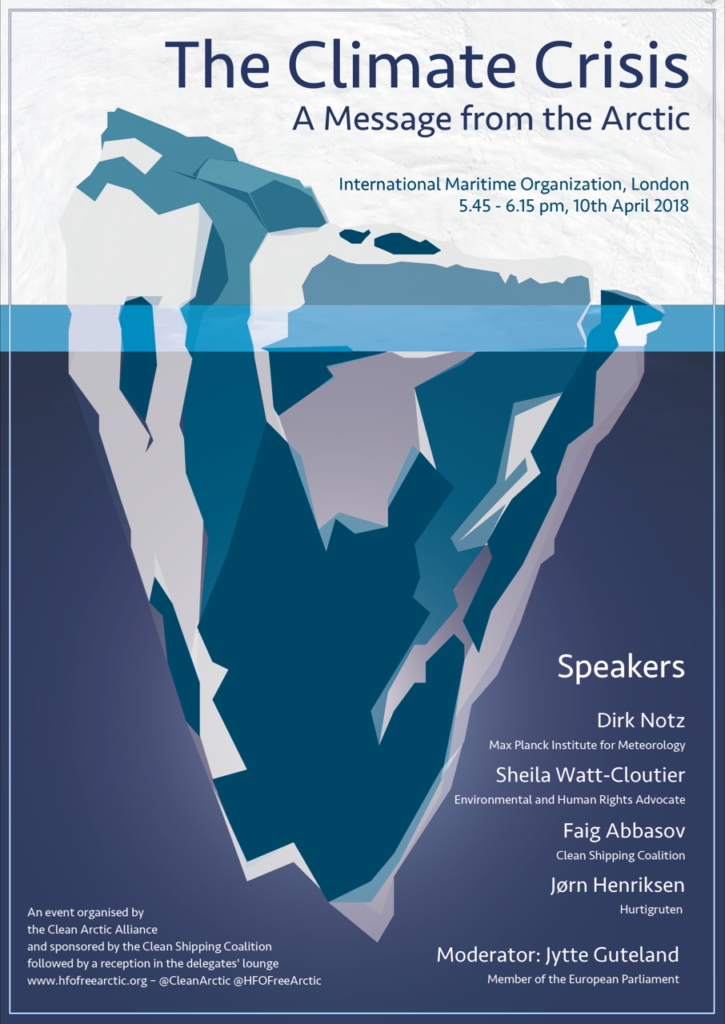
The Clean Arctic Alliance is organising a side-event at MEPC72 on Tuesday, 10 April at 1745: The Climate Crisis: A message from the Arctic. The aim is to increase awareness among IMO delegates about the local and global consequences of the current changes taking place in the Arctic, and to demonstrate the necessity for IMO to agree an ambitious strategy to reduce greenhouse gases from shipping globally and a regional ban on HFO in the Arctic.
Pre MEPC72 Media Briefing regarding heavy fuel oil use by ships in the Arctic.

The agenda of MEPC 72, which runs from 9-13 April at IMO HQ in London, includes discussion on reducing the risks posed by HFO. In addition, a number of papers have been submitted from member states and NGOs “on the development of measures to reduce risks of use and carriage of heavy fuel oil as fuel by ships in Arctic waters”.
Infographic: How Can We Reduce Black Carbon Emissions From International Shipping?
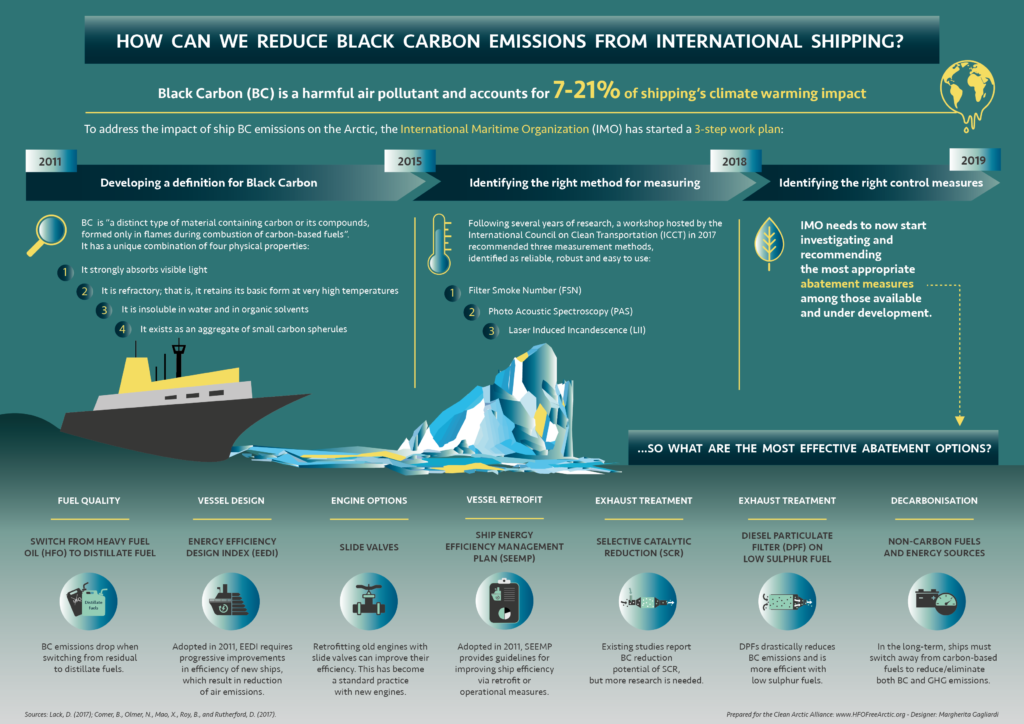
To address the impact of ship Black Carbon (BC) emissions on the Arctic, the International Maritime Organization (IMO) has been tasked with developing a definition for black carbon, deciding on best methodology for measuring black carbon, and identifying abatement options. A considerable number of black carbon abatement options exist with varying reduction potential of BC emissions. Some are readily available, some in development, some expensive, some cheaper. This infographic goes through some of the most effective abatement options and depicts their advantages and drawbacks based on the most up to date scientific literature.
The Arctic Commitment
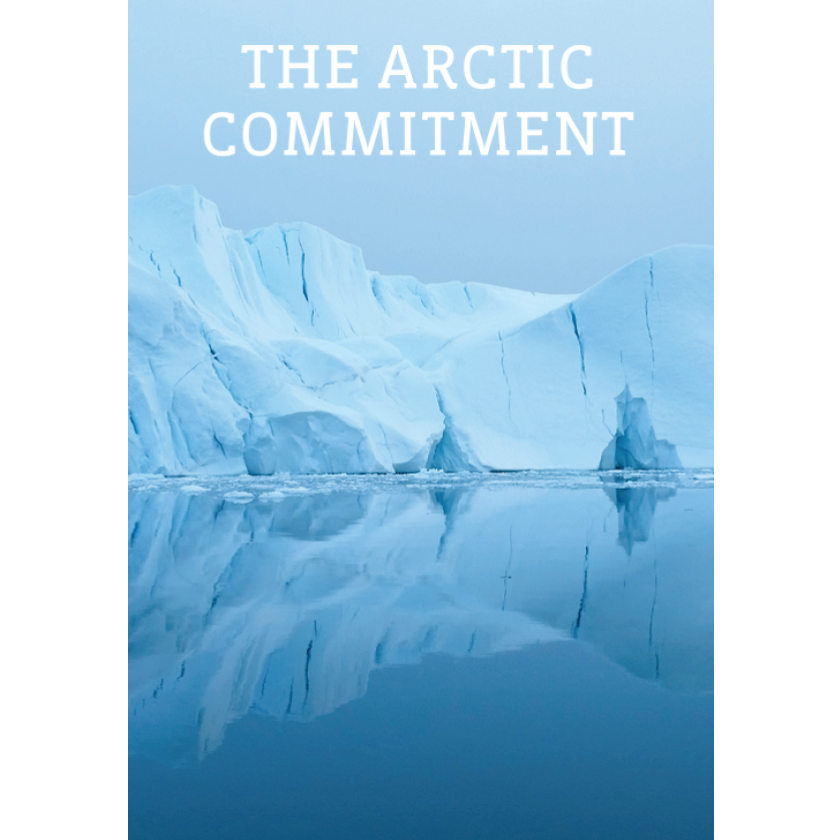
Launched in January 2017 by the Clean Arctic Alliance and cruise ship operator Hurtigruten, this leaflet explains the aims of the Arctic Commitment which are to encourage stakeholders to urge the IMO to phase out HFO use in Arctic shipping and urge shipping companies in the Arctic to switch from the use of HFO to cleaner fuels.
Rise in Arctic Shipping Traffic is Bad News for Black Carbon Emissions
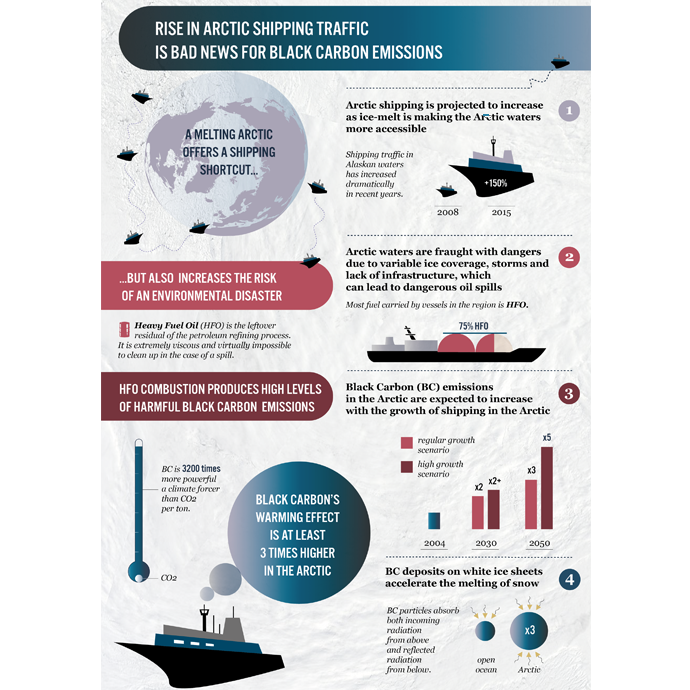
An infographic by the Clean Arctic Alliance
As new shipping routes open in the Arctic and traffic increases, Black Carbon (BC) emissions from combustion of heavy fuel oil (HFO) further exacerbate the melting of ice and increases the cause of health risks, shipping incidents, and their associated economic cost. There are cleaner solutions available.
Heavy Fuel Oil: A Threat to the Arctic
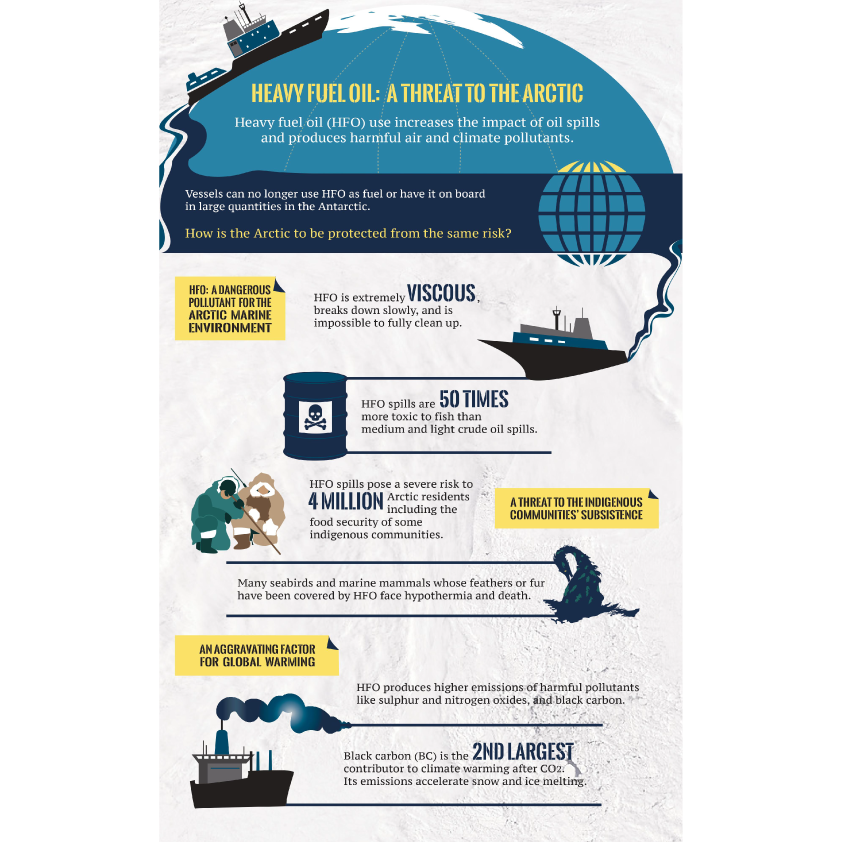
An infographic by the Clean Arctic Alliance
Compelling facts and figures demonstrating the many risks associated with the use of heavy fuel oil (HFO). The document makes the case for the rapid phasing out of HFO use from Arctic shipping and offers some solutions on measures to protect the Arctic environment.

